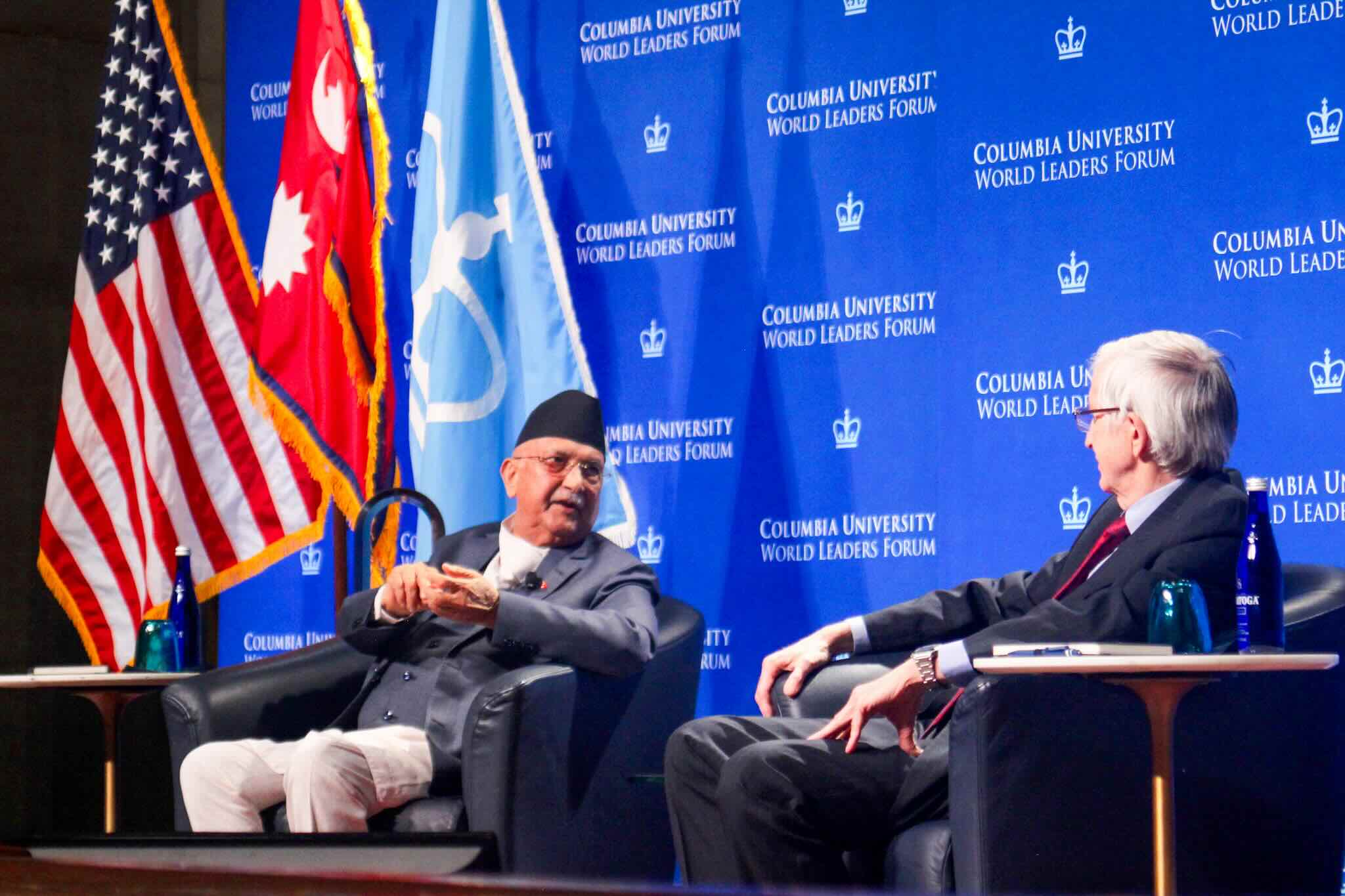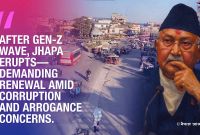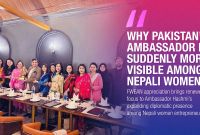PM Oli Throws Down the Gauntlet: Boldly Challenges India and China During U.S. Speech

Prime Minister K.P. Sharma Oli of Nepal spoke at the prestigious World Leaders Forum on Monday at Columbia University, discussing "Nepal’s Journey to Democracy and Economic Prosperity." The forum, a hallmark of Columbia’s efforts to engage students and faculty with global leaders, provided an ideal platform for Oli to share his insights into Nepal’s past, present, and future, particularly its democratic evolution and economic aspirations. The event was moderated by Jenik Radon, an adjunct professor at Columbia's School of International and Public Affairs, who also played a significant role in drafting Nepal's interim constitution during the country’s constitutional peace process. The event was co-sponsored by the South Asia Institute.
Introduction and Opening Remarks
The event began with an introduction by University Provost Angelina Olinto, who emphasized Oli's pivotal role in Nepal's political transformation. Olinto spoke highly of Oli's active engagement as a political activist, a youth leader, a parliamentarian, and a prime minister. She noted, "This includes the active role the Prime Minister has played as a political activist, a youth party leader, a parliamentarian, and a prime minister in this national transformation."
Following Olinto's introduction, Oli took the stage and delivered a 12-minute speech that highlighted Nepal’s political and economic trajectory. His speech touched on the milestones in Nepal’s journey, beginning with its modern history in 1768, when the nation was unified, to the establishment of its 2015 constitution, which he described as the foundation for the country's future progress. Oli reflected on how challenging this path had been, stating, "The road to modernity and democracy was not a straight path."
Oli's address echoed a strong sense of reverence for learning and knowledge, referencing Nepal’s cultural values. “In our Nepali culture, we regard places of learning as temples of wisdom, and when I am standing here, I feel as though I am standing in one of the greatest temples of all,” he remarked, drawing applause from the audience.
Nepal’s Struggle for Freedom and Democracy
During his speech, Oli discussed his own political journey, framing it as a lifelong struggle for freedom. He emphasized the importance of comprehensive democracy, which he defined as a system that ensures equal rights, social justice, equal access to opportunities, and security and dignity for all citizens. For Oli, Nepal’s history of political unrest and the subsequent establishment of democracy was a story of resilience and dedication to human rights and inclusivity. He credited the 2015 constitution for setting the stage for Nepal’s ongoing pursuit of economic prosperity, noting that the document allowed the nation to shift its focus from political conflict to sustainable development.
Climate Change and Sustainable Development
Climate change featured prominently in Oli’s address and in the question-and-answer session that followed. Moderator Jenik Radon posed a direct question about Nepal’s response to climate change, to which Oli responded with optimism. He acknowledged the issue's seriousness, particularly for a country like Nepal, which is highly vulnerable to natural disasters such as floods, landslides, and glacial melt caused by climate change.
Oli stressed that Nepal has been proactive in battling climate change, largely by preserving the natural form of the land and focusing on sustainable environmental practices. He noted that Nepal’s geographical location and rich biodiversity give it a unique responsibility and opportunity to be at the forefront of global environmental preservation efforts. “We are aware of the issues, and we have been working on preserving our natural landscapes. Our mountains, forests, and rivers are our heritage, and we must protect them for future generations,” Oli said.
He pointed out that Nepal’s commitment to tackling climate change is evident in its policies promoting green energy, reforestation, and sustainable agriculture. Oli also emphasized the need for international cooperation, especially in terms of financial and technical support from developed nations, to address the consequences of global warming.
The Youth Exodus: Challenges and Solutions
A significant portion of the discussion focused on the issue of youth migration. Every year, approximately one million Nepali citizens leave the country in search of employment and educational opportunities abroad, with 100,000 studentspursuing studies in foreign countries. Radon framed this trend as a significant challenge for Nepal’s economic development, asking what steps the government was taking to reverse this outflow and make Nepal more attractive for its youth.
Oli acknowledged the problem but offered a balanced view. He admitted that youth migration is a direct result of limited educational and job opportunities in Nepal. However, he pointed out that many Nepali citizens who go abroad for education or work eventually return to contribute to the country’s development. “People talk about the rush in the output, youths are going outside, outside, outside,” he said, “but they don’t take any account of the people coming back too.” Oli emphasized that the government is focusing on creating better job opportunities and improving education to encourage the country’s youth to stay and contribute to Nepal's economic prosperity.
In addressing these concerns, Oli noted the importance of foreign remittances, which form a significant portion of Nepal’s GDP. However, he also stressed the need for domestic development programs that can provide sustainable, long-term employment opportunities for young people. His vision for Nepal’s future included initiatives to strengthen local industries, improve infrastructure, and attract foreign investment, all of which would help create a thriving economy capable of retaining its workforce.
Nepal’s Relationship with India and China
When it came to foreign relations, Oli was asked by the students about Nepal’s position between its two powerful neighbors—India and China. Oli diplomatically described Nepal’s relationship with both countries as one of lasting friendship and mutual respect. He emphasized that Nepal’s foreign policy is grounded in the principles of non-alignment and sovereignty.
“Nepal lies between two giant neighbors,” Oli said, “with whom we have a friendship that is undestroyable and lasting.” He elaborated that both India and China are vital partners for Nepal’s economic development, but Nepal remains committed to maintaining its independence in foreign policy matters. He spoke of Nepal’s active engagement with both nations in terms of trade, infrastructure development, and cultural exchange, all of which are crucial for Nepal's prosperity.
Oli sidestepped a direct response regarding Nepal’s abstention from the U.N. resolution calling for Israel to withdraw from the Palestinian territories. However, he reiterated that Nepal has always been a proponent of peace. Drawing on Nepal’s cultural heritage as the birthplace of Lord Buddha, Oli stressed that the country is committed to promoting peace and diplomacy on the global stage.
Oli talked about the principles of non-alignment and sovereignty in foreign policy, which signify a threat to Nepal’s sovereignty from China and India. By discussing this, Oli himself seems to perceive the threat. Making such a statement in the USA implies that Nepal does not want interference from China and India. Additionally, many Indian authors and politicians falsely claim that Buddha was born in India, spreading this misinformation globally. Oli told the world the truth about this false information spread by the Indians, clarifying the reality of Nepal as Buddha's birthplace.
Conclusion: A Vision for the Future
As the event concluded, Oli’s message was one of optimism and determination. He reiterated Nepal’s commitment to democracy, economic prosperity, and sustainable development. The prime minister expressed his confidence that Nepal would continue to grow as a democratic nation, ensuring that its people enjoy both freedom and economic security.
The students and faculty at Columbia University were left with a clear understanding of Nepal’s journey, its challenges, and its aspirations. The forum provided a rare opportunity for direct dialogue with one of South Asia’s most influential leaders, and Oli’s responses underscored his commitment to Nepal’s future, one that is built on the foundation of democracy, peace, and inclusive economic development.




![From Kathmandu to the World: How Excel Students Are Winning Big [Admission Open]](https://nepalaaja.com/img/70194/medium/excel-college-info-eng-nep-2342.jpg)
